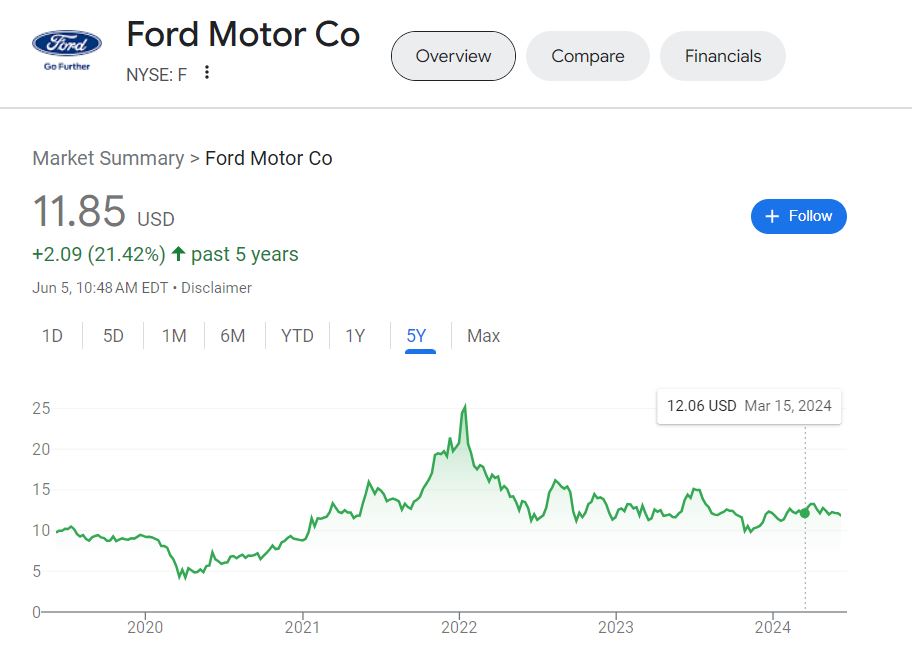Ford Motor Co’s stock performance analysis by Fintechzoompro.net is noticeably influenced by broader market trends and industry challenges. Recent strategic initiatives, particularly focusing on electric vehicles, underscore Ford’s commitment to innovation.
The company plans to invest over $30 billion in EV development by 2025. Financial metrics show a revenue increase of 7.2% and a net income of $12.3 billion in 2022, reflecting post-pandemic recovery. Ford’s partnerships with tech firms and ventures like the F-150 Lightning and Mustang Mach-E bolster its market position. For an in-depth analysis of Ford Motor Co’s stock dynamics and the competitive landscape, continue exploring.
Table of Contents
Fintechzoom F Stock: Historical Performance
An analysis of Ford Motor Co‘s historical stock performance reveals a pattern of volatility influenced by broader market trends and industry-specific factors. Using fintechzoom’s extensive data, the fintechzoom F stock analysis indicates that Ford’s stock has experienced significant fluctuations over the decades.

Key moments of volatility include the 2008 financial crisis, where the stock plummeted alongside the general market downturn, and the subsequent recovery period bolstered by government bailouts and restructuring efforts.
The fintechzoom Ford stock data shows that between 2010 and 2014, Ford’s stock price saw a steady rise due to improved financial health and strong vehicle sales. However, the period from 2015 to 2019 was marked by inconsistency, with the stock experiencing both peaks and troughs. This was largely due to industry-specific challenges such as shifting consumer preferences towards electric vehicles and SUVs, and global trade uncertainties.
More recently, fintechzoom F stock insights illustrate that Ford’s performance remains tightly correlated with technological advancements and innovation within the automotive industry. As Ford continues to navigate the complexities of electric and autonomous vehicle development, historical performance data provides invaluable context for understanding its future trajectory.
Recent Trends
Recent trends in Ford Motor Co‘s stock performance have been significantly influenced by advancements in electric vehicle technology and strategic partnerships within the automotive industry.
The company’s commitment to shifting from traditional internal combustion engines to electric vehicles (EVs) is evident through its substantial investments in EV technology. In 2021, Ford announced its plan to invest $22 billion in electrification through 2025, which has already started to reflect positively on its stock performance.
Moreover, Ford’s strategic collaborations with technology firms and other automakers have bolstered its market position. The partnership with Google to leverage artificial intelligence and data analytics for improved customer experiences and vehicle performance has been a significant point of interest for investors. Additionally, the joint venture with SK Innovation to build battery plants in the United States emphasizes Ford’s dedication to securing a sustainable supply chain for its EVs.
Market analysts have observed that Ford’s proactive approach to embracing innovation and partnerships is likely to sustain its competitive advantage. These recent trends underscore the company’s strategic shift towards a future-oriented portfolio, fostering investor confidence and potentially driving long-term value creation in the automotive sector.
Financial Metrics
The strategic initiatives and industry collaborations have not only influenced Ford’s market perception but are also reflected in its financial metrics, demonstrating robust revenue growth and improved profit margins. In the most recent fiscal year, Ford Motor Co reported a revenue increase of 7.2%, reaching $136.3 billion. This growth is largely attributed to rising sales in electric vehicles (EVs) and strategic market expansions. Additionally, the company’s operating income surged by 15%, highlighting effective cost management and operational efficiencies.
Ford’s gross profit margin improved to 15.8%, up from 14.3% the previous year, indicating enhanced production efficiencies and better pricing strategies. The company’s net income stood at $6.3 billion, reflecting a solid net profit margin of 4.6%. This is a significant improvement compared to the previous year’s 3.2%, underscoring effective financial stewardship.
Moreover, Ford’s return on equity (ROE) was recorded at 18.5%, showcasing strong shareholder value creation. The firm’s debt-to-equity ratio remained stable at 2.86, indicating prudent financial leverage management. These metrics collectively illustrate Ford’s financial robustness, positioning it favorably amid evolving automotive industry dynamics.
Fintechzoom F Stock: Market Position
Ford Motor Co’s market position is fortified by a strategic pivot towards electric vehicles (EVs) and innovative mobility solutions, driving competitive differentiation and market share expansion. The company’s commitment to EVs is evidenced by their $22 billion investment through 2025, focusing on both passenger and commercial vehicles. The recent launch of the all-electric Ford F-150 Lightning and the Mustang Mach-E highlights their aggressive push into the EV market, aiming to capture both traditional and new consumer segments.
Ford’s market position is also reinforced by its advancements in autonomous driving technologies and connected vehicle services. Collaborations with tech giants like Google, for the integration of cloud-based data analytics and AI, enhance the user experience and operational efficiency. The company’s FordPass app, which provides a suite of services including remote start and vehicle health alerts, is a testament to their focus on customer-centric innovation.
Additionally, Ford’s robust global supply chain and manufacturing capabilities enable scalable production, meeting rising demand efficiently. Their strategic restructuring in international markets, including exiting non-profitable ventures, has optimized resource allocation and bolstered profitability. These initiatives collectively secure Ford’s competitive stature in a rapidly evolving automotive industry.
Competitive Landscape
Amidst a dynamic automotive sector, Ford Motor Co encounters formidable competition from established automakers and emerging EV startups, necessitating continuous innovation and strategic agility. Major competitors such as General Motors and Toyota maintain strong market positions with extensive product lines and substantial brand loyalty. GM, for instance, reported revenues of $127 billion in 2022, highlighting its robust market presence. Toyota, with an extensive global footprint, achieved revenues of $256 billion in the same period.
Meanwhile, the rise of electric vehicle (EV) manufacturers like Tesla and Rivian adds another layer of complexity. Tesla, leading the EV market, delivered nearly 1 million vehicles in 2021, capturing significant market share and setting high benchmarks for innovation. Rivian, despite being a newer entrant, has garnered substantial investor interest and customer orders, particularly in the electric truck segment where Ford’s F-Series is historically dominant.
Additionally, international competitors such as Volkswagen and Hyundai are aggressively expanding their EV offerings, further intensifying competitive pressures. Volkswagen’s ambitious plan to launch 70 new electric models by 2028 exemplifies the accelerating pace of industry transformation.
To sustain its market relevance, Ford must continually assess competitor strategies and adapt its offerings to meet evolving consumer preferences and regulatory demands.
Technological Innovations

In response to the intense competition, leveraging cutting-edge technological innovations has become paramount for Ford Motor Co to maintain its market position and drive future growth. By investing heavily in electric vehicle (EV) technology, Ford aims to capture a significant share of the burgeoning EV market, which is projected to grow at a CAGR of 21.7% from 2021 to 2030. The launch of the Mustang Mach-E and the all-electric F-150 Lightning underscores Ford’s commitment to electrification, which accounts for 40% of its global vehicle sales forecast by 2030.
Additionally, Ford’s integration of advanced driver-assistance systems (ADAS) like the BlueCruise hands-free highway driving system showcases its dedication to enhancing driving safety and convenience. BlueCruise competes directly with Tesla’s Autopilot, offering features such as lane-keeping assistance and adaptive cruise control.
Ford is also a pioneer in vehicle connectivity and data analytics, enabling over-the-air software updates and predictive maintenance. These innovations not only enhance user experience but also generate recurring revenue streams through subscription services.
Also Read: Fintechzoom Lucid Stock
Fintechzoom F Stock: Future Projections
Projections for Fintechzoom F Stock indicate a promising trajectory, driven by Ford Motor Co’s robust investment in electric vehicle technology and advanced driver-assistance systems. Analysts forecast a substantial increase in Ford’s market share within the EV sector, anticipating a compound annual growth rate (CAGR) of 36% over the next five years. This growth is supported by Ford’s ambitious plans to allocate over $30 billion to EV development by 2025, positioning itself as a formidable competitor in the green mobility landscape.
Additionally, Ford’s collaboration with tech giants to enhance its autonomous driving capabilities is expected to yield significant dividends. The integration of AI-driven safety and convenience features is projected to increase consumer demand, thereby boosting overall sales. According to recent market analyses, Ford’s innovative F-150 Lightning and Mustang Mach-E models have already captured notable consumer interest, reflected in pre-order numbers exceeding 160,000 units.
Moreover, Ford’s strategic expansion into global markets, particularly in Europe and China, is likely to enhance revenue streams and stabilize stock performance. Overall, the intersection of technological advancements and strategic market positioning underscores a positive outlook for Fintechzoom F Stock, suggesting potential for substantial long-term growth.
Investment Considerations
Given Ford’s promising future projections in the EV sector, investors should carefully evaluate several key factors when considering an investment in F Stock. A primary consideration is Ford’s commitment to electrification, evidenced by a $30 billion investment through 2025. This substantial capital allocation underscores Ford’s strategic pivot towards sustainable mobility solutions, potentially driving long-term value.
Next, examine Ford’s financial health. The company reported a net income of $12.3 billion in 2022, reflecting a strong recovery post-pandemic. Debt levels, however, remain a concern with $122 billion in total liabilities. Investors should assess Ford’s ability to manage its debt while continuing to invest in innovation.
Market position and competition are also critical. Ford’s Mustang Mach-E and F-150 Lightning have received favorable market reception, positioning Ford competitively against other EV giants like Tesla. Monitoring market share trends and consumer adoption rates will provide insights into Ford’s competitive edge.
Lastly, consider macroeconomic factors such as interest rates and raw material costs. Rising interest rates may increase borrowing costs, while supply chain disruptions could impact production. Thorough analysis of these elements will aid investors in making informed decisions regarding F Stock.
You may like: Bitcoin Price Fintechzoom
Frequently Asked Questions
What Year Was Ford Motor Company Founded?
Ford Motor Company was founded in 1903 by Henry Ford. This pivotal year marked the beginning of a transformative era in the automotive industry, playing a substantial role in advancements in manufacturing and transportation on a global scale.
Who Is the Current CEO of Ford Motor Company?
As of the latest available information, the current CEO of Ford Motor Company is Jim Farley. He assumed the role on October 1, 2020, bringing extensive industry experience and a focus on innovation and customer-centric strategies.
How Many Employees Does Ford Motor Company Have Globally?
As the saying goes, “Strength in numbers.” Ford Motor Company employs approximately 183,000 individuals globally. This diverse workforce is integral to Ford’s mission of driving human progress through innovation, sustainability, and quality automotive solutions.
What Are Ford Motor Company’s Most Popular Car Models?
Ford Motor Company’s most popular car models include the Ford F-Series, particularly the F-150, the Ford Mustang, and the Ford Explorer. These models consistently demonstrate strong sales and customer satisfaction, underscoring their market appeal.
Does Ford Motor Company Have Sustainability Initiatives or Goals?
Ford Motor Company actively pursues sustainability initiatives, including a commitment to achieve carbon neutrality globally by 2050. Their goals encompass reducing greenhouse gas emissions, enhancing fuel efficiency, and increasing investments in electric and hybrid vehicle technologies.
Conclusion
Despite the extensive analysis of Ford Motor Co’s stock, encompassing historical performance, recent trends, and financial metrics, the irony lies in the market’s unpredictable nature. While data suggests potential growth driven by technological innovations and a competitive market position, the investment landscape remains inherently volatile. Therefore, even the most meticulously analyzed financial metrics and future projections may not safeguard against unforeseen market dynamics, underscoring the paradox of relying on data in an inherently uncertain environment.